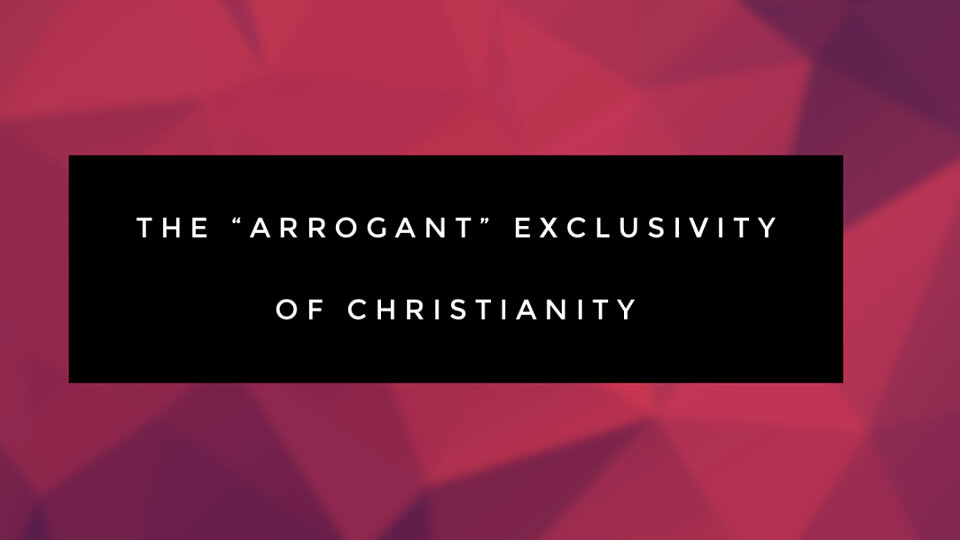By Nick Judd
A popular objection to Christianity today is that our exclusive claims are arrogant. In our time inclusiveness and tolerance are seen as the pinnacle of virtue. In fact, these are some of the primary words used to promote our culture’s current philosophy.
Tolerance
Inclusiveness
Acceptance
My truth
The vocabulary of the “spirit of the age” could provide us with more examples but I chose these because tracing how they got to their place in modern thought will give us context as to why the world hates Christ’s exclusivity. And yes, it is Christ Himself who is to blame for this exclusivity and He makes no apologies for it!
First we need to understand that every era in western history can be broken down into a progression of philosophies. Now, you may think the average person has very little interaction with philosophy but allow me to show you otherwise. The philosophy of the culture in every age affects everyone profoundly even when it does so indirectly. For example, how many memes have you seen with multiple paragraphs? None. Yet many of them are addressing moral issues with humor or snark. How do you understand their meaning from one sentence? How do millions of people “get the joke” with just one picture and one sentence? Because we all consume the philosophy of our age. You know how you ought to think and feel about any cultural issue right now in order to be accepted by the majority. That set of beliefs and virtues that the majority holds is the philosophy of our age.
We are currently in the beginning of a new philosophical era that some call “post-postmodernism.” As you could probably guess what came before that was postmodernism, which came from modernism, which followed pre-modernism. For our purposes let me give you a very inadequate concise description of each. In terms of the way the culture thinks, it would go like this:
Pre-Modernism (Pre-18th century): we understand that there is more than the natural world and trust that God is ordering all things for His purpose.
Modernism (18th century – mid-20th century): we need a rational, usually naturalistic, answer for everything. Think, “scientific method”.
Postmodernism (Mid-20th century – late 20th century): we can’t find those answers and we still want them but now it’s scientific to be skeptical of everything. And, it’s ok for people to have their own “truth”.
Post-Postmodernism (Today): we still want the answers but we’ll import some fluff. Mystical stuff, religion and things like that are good so long as they make us more “whole” and don’t offend.
And there it is. Offending is the greatest crime in our post-postmodern culture. The whole of this particular argument against Christianity rests on the idea that exclusivity is a bad thing. That idea is very easily shown to be not only incorrect, but absurd. Here’s how:
Question: “Is it wrong for Christ to be so exclusive?”
Answer: “Of course.”
Question: “So, am I wrong for believing that?”
Answer: “Yes, you are.”
Question: “Isn’t that an exclusive claim to say that I’m wrong?”
The one believing that exclusivity is wrong just made an exclusive claim: they hold the correct position and you do not. If you were to ask them, “Can both positions be true?” and they answered “Of course not” they’ve just made another exclusive claim. So you see the problem is not that exclusivity is bad in this context. Truth is by definition exclusive because it rules all other competing ideas to be false.
Now, the only thing to address is, “how is Christ exclusive and why?” The answers are fairly simple. There is One God and one way to Him and that is exclusively through His Son. He is God and this is the path He has given us. As to why, there is no other way for our sins to be atoned for than to have Christ take the punishment in our place. To ask why there is no other way, you might as well ask “why is there only one sun in our solar system?” If there were two, it would be two solar systems. The answer is in the question. “Why is Christ the only way to God?” Because God is God and He has made it so. That is true and therefore exclusive. But remember so is all truth.
That may lead you to the question, “if truth is exclusive as you say, then how do we know that your claim of there being one God, and Christ being the only way to Him is true.” We’ll address this in another article. The important thing for us to remember here is that in terms of truth, there is nothing wrong with exclusivity. In fact the very idea of truth is dependent upon it.

